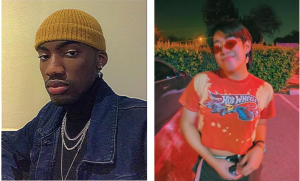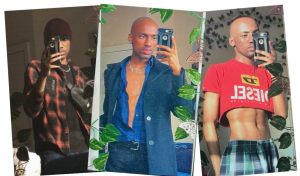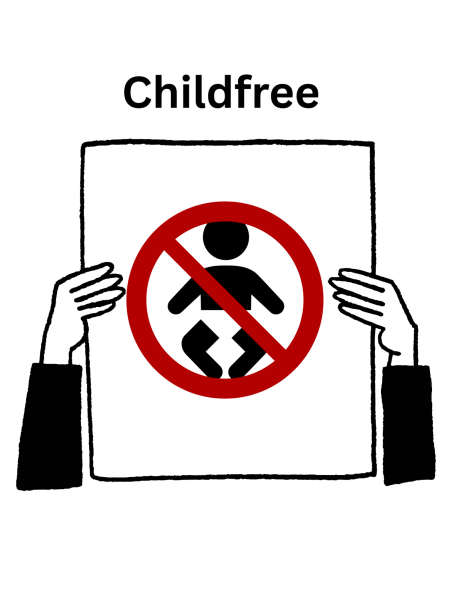How GenZ is breaking down male fashion barriers
December 1, 2021

Putting on your daily foundation, followed by some eyeliner, a ring on every other finger, along with some bracelets and necklaces, all finished up with a crop top and a skirt before going out. For most, reading that sentence has an automatic assumption of femininity, which is true, but also specifically for women. However, for young people, this description is also becoming more fitting for men.
Ronald John Magoha, 22, was born in Dar es Salaam, Tanzania, which he left at the age of eight. First, he lived in New York City until he was 14, then moved to London, England where he currently resides. Magoha’s style is a combination of masculinity and femininity, and it’s his truest authentic self.
Fashion to Magoha signifies, “…identity, it’s how I express myself. It’s one of the first things people see when they look at me… When I think of men’s fashion, I think of masculinity with what’s seen as normal, but I’m open to femininity too.”
Magoha explains that his style includes crop tops, nail polish, and being more open to the idea of presenting feminine. There are also days when he just wants to wear a hoodie and jeans and feels just as great.
Having lived in both the U.S. and U.K., he said there was still this idea no matter the country that men’s fashion is very similar. In America, he noticed the same shirt and jeans/shorts type of style in his age group. There wasn’t much stray for men’s fashion sticking to predominantly shirt and jeans/shorts. In England, it is very typical for men to wear tracksuits in his age group as well as fanny packs.
Magoha said despite the increased fluidity in the fashion trends for his generation, not everyone is accepting.
“I wear crop-tops, and because of that, there are people that will have plenty to say. I remember I was walking down the street with some friends, and out of the blue there were people shouting, ‘Wear a full shirt’ right at me,” Magoha said.

He continues, “I hate that what I’m doing is considered brave. It’s fabric and colors, but I get that it’s difficult,” Magoha stated.
This idea that there are such similar clothing options available in most men’s cultures has been researched by philosopher Cooper Thompson in his research titled “A New Vision of Masculinity”, published by MIT Press. It research argues that western culture emphasizes homogeneity. This means that there is a strong built-in idea that men should try to act and dress the same, and if they don’t there is social discipline. If a man deviates from what’s socially acceptable, he can be subjected to derogatory name-calling, stares, whispers, and even physical harm.
Thompson said in his research paper that within this social standard of what masculinity means for men is an embedded idea to not be feminine, to not show emotion, and not be as expressive. It’s because of this that there is anger and discomfort when other men don’t follow masculinity’s guidelines.
Gen Z fashion has created styles like e-boy (electronic boy), which is a dark color palette of clothing with big boots, lots of jewelry, and nail polish, similar to emo/gothic trends. It focuses on the color black, so there is an emphasis on black nail polish, eyeliner, and mascara. There is also a fashion trend known as a soft boy that is very popular, and it normalizes lighter colors like pink, which is seen as taboo for men to wear. There is also a makeup element to the soft boy aesthetic that includes drawn-on freckles, and light blush.
Clementine, who prefers to only go by Clementine, being his chosen name for himself that makes him feel the most comfortable is 18 and resides in Bakersfield, California. He has also found his true self through the fluidity of Gen Z fashion.
“I like to see it (fashion) as a book, it’s part of me, it’s sorta like the cover of the book. I want people to look at me and get an idea of who I am,” said Clementine.
Clementine explains that the way he dresses is for him, and not really meant to be seen as some double meaning.
“People like to say that I’m promoting propaganda, but I dress the way I do because I like it. If you can rock a skirt, what’s stopping you,” said Clementine.
He explains that the lack of variety in men’s fashion was a major reason for him wanting to start expressing himself in Gen Z fashion trends.
“It’s important for a guy to also have an outlet to be expressive and yourself, and if something considered girly makes you comfortable then be comfortable,” said Clementine.
He also elaborated on how Gen Z fashion trends opened a doorway to makeup.
“I like to wear eyeliner, mascara, and concealer. I’m still pretty new to the makeup thing, but I’ve enjoyed it so far,” explained Clementine.
Both Magoha and Clementine stressed the idea that they aren’t doing this for the sake of breaking down gender barriers. They do it because it’s what makes them feel like themselves. It just happens to be how they express themselves.
For Magoha, “It’s all about being open. We can’t call fashion stupid, it’s our identity. It’s what we feel comfortable with. Learn that the word normal is subjective.”
“Try your best to tap into yourself. Yes, these trends exist and can be a gateway to expression that is much more fluid, but they’re not defining. If you’re interested, do it,” Clementine said.






